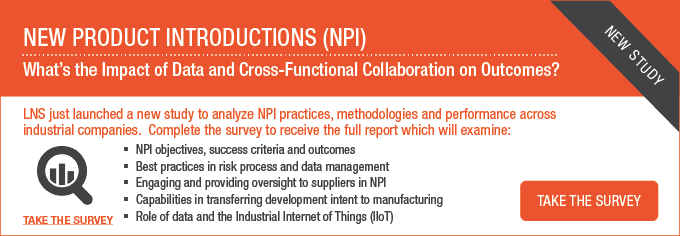2017 was a challenging year for quality. Many manufacturers had to evolve their quality management system due to changes in standards and compliance requirements, providing an opportunity to rethink processes, organizations, and leadership support.
Click here to speak with Dan Jacob
There is a continued focus on process harmonization and common competency development. Mergers and acquisitions (M&A) have accelerated in many industries over recent years. This M&A activity often fragments quality management processes, competencies, and data. LNS has identified that the market continues to make progress in flexibly unifying operations. However, there is much progress still needed in this area. LNS data recognizes that 43% of manufacturers have no processes harmonized, and the median harmonization of any given process is 7% across the market (n=280, 2017 data). Non-conformances (NC)/corrective and preventive actions (CAPA) is the most commonly harmonized process at 22% of all respondents.
Manufacturers also continued their quality technology journey. Much of the market continues to limp by with electronic documents and spreadsheets, so for many, a critical step in this journey is adopting enterprise quality management software (EQMS) to centralize quality data. EQMS adoption can take as it is adopted by groups of processes. When done appropriately, EQMS adoption requires consensus on new harmonized methods. As LNS projected in 2016, the market has rapidly shifted its EQMS adoption to Cloud with 66% of the market planning to choose a Cloud-based EQMS in 2017.
Those that have already adopted EQMS have begun their move to Quality 4.0 by leveraging new types of data such as signal data from manufacturing equipment and connected products, combined with new analytics such as machine learning. These leaders have built initiatives like zero defect, smart manufacturing, and connected products.
Top Quality Trends in 2018
Quality 4.0 Accelerating
What are your company’s plans for IIoT? Quality 4.0 is the application of industrial internet of things (IIoT) technologies to quality and is a top use case for IIoT. LNS has been tracking market’s plans for IIoT since 2014, and the market has shifted dramatically. For those that are still investigating or don't know, IIoT has shrunk from 79% in 2014 to 50% in 2016 and stands at 38% today. Most have either started or plan to begin an IIoT initiative. This change in market has been spurred in part by the growing quantity of IIoT success stories, as well as increasingly mature and easy to deploy solutions.
LNS’s anecdotal fully supports this shift. Recently, there has been a substantial acceleration in IIoT business cases centered on approaches such as smart manufacturing and Digital Twin. Quality initiatives such as zero defect build upon these IIoT approaches to add substantial operational and financial benefits.
How does zero defect build upon smart manufacturing and Digital Twin? Let’s assume that a manufacturer has quality data (as compared to quality documents) in an EQMS. This quality data can then be combined with data such as inspection results, data from manufacturing execution systems (MES)/manufacturing operations management (MOM), warranty data, and sensor data from smart manufacturing. This new data continuum can identify products, batches or processes that pass quality checks but still result in in-service failure. Over time, it can permit real-time identification of failures that were previously undetectable like, can certain vibration levels measured in manufacturing equipment correlate to higher warranty failures?
Manufacturers Gain Traction with Supplier Quality Management (SQM)
Our research shows that SQM is one of the most critical areas for corporate success, but one of the least mature. Even organizations that have invested heavily in SQM competencies and processes have yet to convert SQM into automated, data-driven processes. In fact, only 21% of the market has adopted technology to automate SQM.
Expect this scenario to change this year. In the coming 12 months, 25% of manufacturers plan to automate SQM with software, 31% of the market plans to improve data-driven decision-making by gaining real-time visibility into supplier quality metrics, and 19% plan to enhance risk-based supplier quality audits.
New Product Introduction (NPI) Becomes More Collaborative
Today’s manufacturers face pressures like increasing product complexity, changing global markets, demanding regulatory bodies, shifting workforce needs, and complex value chains, all the while the release cycles shrink, and M&A continue to fragment the quality management processes. While late cycle compromises can always be damaging, the risks have never been higher. Today’s business customer has unprecedented visibility and analytics, and consumers share experiences, often very positive or negative on social media and internet marketplaces.
The market is responding to these challenges, and LNS sees accelerated plans for EQMS adoption in 2018. 19% of the market plans to deploy cross-functional quality processes and teams across design, manufacturing, and service. The market has similar plans to provide real-time visibility of quality metrics in engineering.
